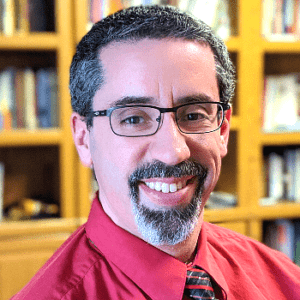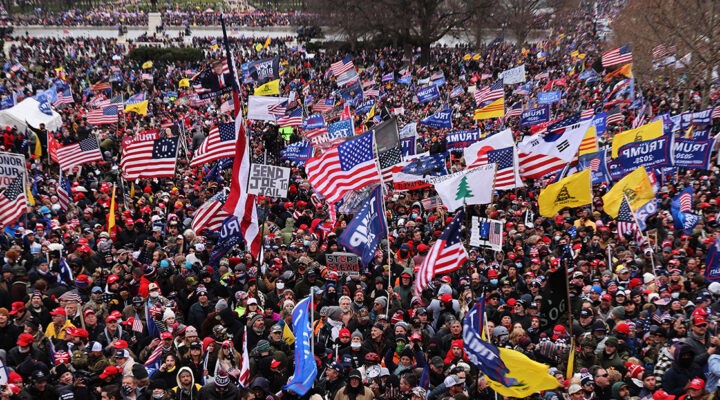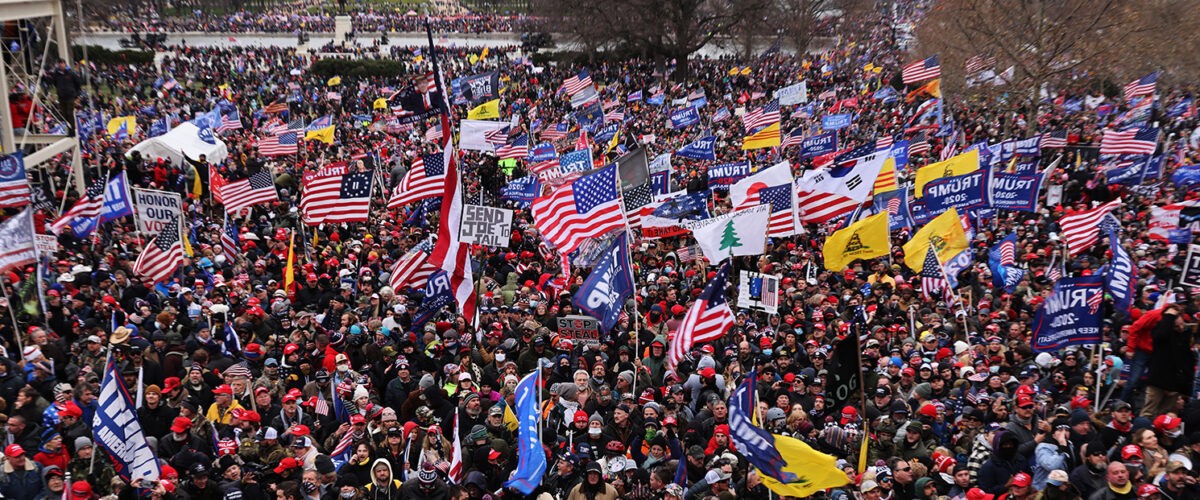On Feb. 9, Baptist Joint Committee for Religious Liberty, in tandem with their movement “Christians Against Christian Nationalism” and in partnership with the Freedom From Religion Foundation, held a livestreamed event that introduced their new comprehensive report on the influence of Christian nationalism in the Jan. 6, 2021, insurrection at the U.S. Capitol.
After some introductory chapters on Christian nationalism itself, the report describes, in stunning detail, the central role Christian imagery and personal influencers played that day and in the lead-up to it. The images and firsthand accounts leave no doubt that the presence of this distorted, militant version of Christianity was not just present in the crowd but was front and center — literally — in many events and online forums for two months after the Nov. 3, 2020, election, up to and including Jan. 6.

Corey Fields
As the report says, the Christian nationalism movement’s contribution “is much more complex and goes deeper than is widely appreciated.”
Katherine Stewart, author of The Power Worshippers: Inside the Dangerous Rise of Christian Nationalism, writes in the report:
The strength of the movement is in its dense organizational infrastructure: a closely interconnected network of right-wing policy groups, legal advocacy organizations, legislative initiatives, sophisticated data operations, leader training, and media and messaging platforms, all working together for common political aims.
During a Nov. 14, 2020, event called “The Million MAGA March,” people led prayers from the stage flanked by a “Jesus Matters” sign, and a photo shows a large group of members of the Proud Boys kneeling in prayer in the street.
During a Dec. 12, 2020, rally called “Let the Church ROAR,” led by the Jericho March, people marched around government buildings blowing shofars, often referencing the biblical story of the Battle of Jericho. On the stage there was a portrait of Mary as the Virgin of Guadalupe. Pastors took the stage telling people that God had a “warrior mandate” for them, that it was a battle cry and a call to arms. They quoted Bible verses: “We can do all things through Christ who strengthens us.” The senior pastor and bishop of New Life Harvest Church in Richmond, Va., told an altered version of biblical stories and said that modern-day Levites were now consecrating America. He also said, “These are our devils, and we will kill them now.”
So, Jan. 6 did not come out of nowhere, but it did come with just as many Christian flags, portraits of Jesus, Bible verses (some of them misquoted), armor of God T-shirts, and impromptu singing of Christian worship songs. All this appeared alongside longstanding symbols of racist oppression like nooses, swastikas, Confederate flags and more. One person leading a charge of people breaking into the Capitol did so while thrusting a Bible into the air. Inside the Senate chamber, the man known as the QAnon shaman led a prayer in Jesus’ name, thanking God for his “white light” and for helping them defeat their enemies.
All the above information and more was compiled by Andrew L. Seidel and is included in the report, which all Christians should read. The report uses the terms “Christian nationalism” and “white Christian nationalism” for these influences. Those are probably the appropriate terms from a sociological perspective, but not from a theological one. There is nothing “Christian” about it, and it openly opposes the best interests of the nation, of a free and constitutionally governed republic.
“Things like this are an important corrective and a way to show the world that many of us are still able to spot evil in broad daylight.”
I could not be more grateful and proud that the word “Baptist” is on this report. Although that label unfortunately has come to be associated with bigotry and the entanglement of church and state, BJC, the leadership of my denomination (ABC-USA) and many others correctly understand the historic Baptist witness for freedom of conscience and the separation of church and state. Things like this are an important corrective and a way to show the world that many of us are still able to spot evil in broad daylight.
Here are some important takeaways from this report:
White Christian nationalism supports the same kind of “sharia law” about which they warned us years ago. Remember when certain think tanks and politicians decided that somehow there was this great threat that states and localities would become governed by Islamic religious law rather than the same constitutions and statutes and processes that have governed us for centuries? Despite this being such a ridiculous and fabricated threat, from 2010 to 2017, 201 anti-Sharia law bills were introduced in state legislatures, and 14 were enacted. Their general (prejudice-based) concern was making sure we don’t have extremist, religious fanatics trying to run things based on their version of God. But that’s exactly what this brand of white Christian nationalism is. It’s simply the Christian version of the very militant, theocratic tendencies they fear from Muslims. Speeches given during these rallies were essentially fatwas, and a call to carry out militant religious jihad in Jesus’ name.
It’s Christians’ turn to disavow distorted versions of their faith. After the 9/11 terrorist attacks, there were many calls for Muslims to condemn them and make it clear they did not espouse the views that motivated the hijackers. Anyone who looked like them, spoke like them, read the same religious book and called God by the same name faced incessant suspicions and demands to say clearly, “That’s not us.” White Christians in America will not know the same pressure and intimidation that comes from being a small minority among the dominant religion, receiving death threats and having their places of worship burned and vandalized. But it seems to me it’s our turn now. If that wasn’t the Jesus of Scripture who showed up at those rallies, then we need to say that loudly.
That quote about the flag and the cross was prescient. In 1917, Eugene V. Debs said, “Every robber or oppressor in history has wrapped himself in a cloak of patriotism or religion, or both.” A modern derivative of unknown authorship (although often wrongly attributed to Sinclair Lewis) says, “When fascism comes to America, it will be wrapped in a flag and carrying a cross.” That quote could be a descriptive caption for many images taken of the Jan. 6 crowd.
This comes from a perfect storm of things that have been brewing for decades (or centuries). In one of the few legitimate and rightly attributed quotes that circulate online, Billy Graham did say in a 1981 interview with Parade magazine, “The hard right has no interest in religion except to manipulate it.” Even though Graham saw it coming early on, evangelical Christianity has made itself available to political and corporate interests again and again, with this generation’s unholy marriage tracing back to Jerry Falwell’s Moral Majority. Falwell was not the first of his kind. In the days of the New Deal, it was James Fifield. Of course, the Christian nationalist idea that this country is only rightly governed by European Christians, using “God’s law,” has been with us in some form ever since this land was first colonized. The American Baptist Policy Statement on Racial Justice, first adopted in 1983, says that the idea of “Manifest Destiny” is “implicitly racist and has permeated both our national history and our American Christian life.” Politicians have had centuries of practice for effectively exploiting this impulse.
“There must be a nonviolent countermovement centered in the Jesus of the Bible.”
There must be a nonviolent countermovement centered in the Jesus of the Bible. The final chapter of the report compiles some of the responses to Jan. 6 from conservative evangelical leaders. Many long-respected figures such as Rick Warren, Beth Moore and the National Association of Evangelicals condemned the attacks and the use of Christian symbols to justify them. Amanda Tyler, BJC executive director, said that “Christians must lead efforts that call out Christian nationalism in a self-critical way.”
Calling it out, however, will not be enough. Although these influences remain somewhat decentralized, they are gaining support from notable places. On Feb. 4, the Republican National Committee adopted a resolution saying that Jan. 6 was “ordinary citizens engaged in legitimate political discourse.” In the ears of the millions of Americans fully bought into the idea that they are engaged in holy war, this will serve as the latest green light. This will not go away on its own.
These people are motivated, well-armed and have the backing of people with plenty of money and power. Religious extremism cannot be reasoned with. It’s time to brush up on nonviolent resistance and build unified Christian coalitions that can protect minority populations, safeguard equal rights and pull apart this tangled web of militant nationalism that has nothing to do with the Jesus of the Gospels.
Corey Fields serves as senior pastor of Calvary Baptist Church in Newark, Del. His work has included ecumenical justice efforts, racial reconciliation and ministry to vulnerable populations. He serves on the board of directors of American Baptist Home Mission Societies.
Related articles:
BJC offers free downloadable report explaining January 6 in light of Christian nationalism
New website illustrates and interprets how religion intertwined with events of January 6
Christian symbols and sedition at the Capitol: The church has work to do | Opinion by Rhonda Abbott Blevins
If you’re paying attention to Christian nationalism, you won’t be shocked by Michael Flynn’s call for ‘one religion under God’ | Opinion by Amanda Tyler


